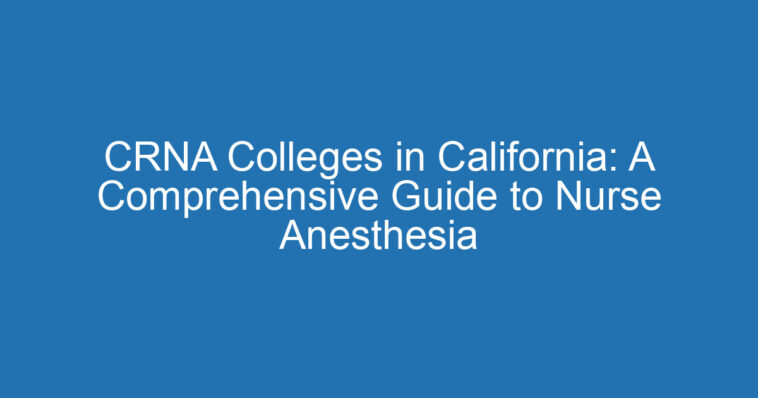Do you want to pursue a career as a Certified Registered Nurse Anesthetist (CRNA) in California? With its thriving healthcare industry and high earning potential, California is one of the attractive destinations for aspiring nurse anesthetists in the United States. In this comprehensive guide, we will explore the top CRNA colleges in California, admission requirements, program details, and career prospects. So, let’s get into it and explore the exciting world of CRNA education in the Golden State.
The Basics of CRNA Education
Before we go further into the details of CRNA colleges in California, let’s take a moment to understand the basics of CRNA education and it’s meaning.
A CRNA is a highly specialized advanced practice nurse who administers anesthesia to patients undergoing surgical procedures. To become a CRNA, extensive education and rigorous training are required.
CRNAs have a foundation in acute care nursing and undergo graduate education to gain the necessary knowledge and skills in anesthesia practice.
To become a CRNA, individuals need to complete a nurse anesthesia program, pass a national certification exam, and obtain state licensure.
Most CRNA programs in California, like those across the United States, have specific requirements for admission.
These requirements typically include a Bachelor of Science in Nursing (BSN) degree, a valid registered nurse (RN) license, a minimum of one year of experience in an acute care setting, and satisfactory scores on the Graduate Record Examination (GRE). Additionally, some schools may require letters of recommendation and conduct interviews as part of the selection process.
Upon completion of a CRNA program, graduates are eligible to take the National Certification Examination administered by the National Board on Certification and Recertification of Nurse Anesthetists (NBCRNA). Successful completion of this exam leads to the title of Certified Registered Nurse Anesthetist.
CRNA Schools in California
California is home to some of the most prestigious CRNA schools in the country, offering comprehensive programs that provide the necessary education and training needed to become a successful anesthesia professional. Here is a list of some of the top CRNA colleges in California and the unique features they offer.
1. California State University Fullerton – Kaiser Permanente School of Anesthesia
California State University Fullerton offers a three-year, full-time CRNA program that is concentrated on courses in anatomy/physiology, pathophysiology, pharmacology, and basic and professional roles.
Upon completion of the program, students are awarded a Doctor of Nursing Practice (DNP) degree with a focus in Nurse Anesthesia.
The program is known for its emphasis on evidence-based practice, epidemiology, quality improvement, leadership, and advocacy.
The program is also affiliated with Kaiser Permanente School of Anesthesia, located in Pasadena, California, providing the students with the opportunity to receive training at affiliated sites in Pasadena and gain hands-on experience in regional and general anesthesia.
To be eligible for admission, applicants must have a minimum of one year of full-time clinical registered nursing experience within the past two years in an adult critical care ICU in the US.
The application process includes completing a prospective student profile, submitting an online application through the CRNA Prospective Student Portal, and attending an interview.
2. Loma Linda University School of Nursing
Loma Linda University School of Nursing offers a highly regarded and competitive CRNA program that awards its students a Doctor of Nursing Practice (DNP) degree. The program is run for 36 months and is focused on providing comprehensive anesthesia care and equips students with the knowledge and skills necessary to excel in the field.
With a low student-to-faculty ratio, students receive personalized attention and guidance throughout their education. Clinical rotations at various healthcare facilities provide valuable hands-on experience, preparing students for the challenges of a career in nurse anesthesia.
To be eligible for acceptance into the CRNA program, applicants must have a Bachelor’s degree in nursing from an accredited school in the United States or an equivalent degree from another country. Other requirements include a cumulative GPA of 3.0 or higher, a science GPA of 3.0 or higher, and an unrestricted nursing license.
3. National University – Fresno
National University’s Fresno campus offers a highly competitive and rigorous DNAP program for aspiring nurse anesthetists. The program is renowned for its strong curriculum that covers advanced health assessment, leadership, healthcare policy, and pharmacology.
The DNAP program is a 36-month hybrid program consisting of two phases. Phase 1 is a 15-month onsite didactic phase in Fresno, California, where students will focus on theoretical coursework. Phase 2 is a 21-month clinical residency phase where students will gain hands-on experience in anesthesia care delivery.
With small class sizes and a dedicated faculty, students receive individualized attention and support. Clinical rotations provide hands-on experience in diverse anesthesia settings, ensuring graduates are well-prepared for their future careers.
To be eligible for the DNAP program, applicants must meet certain requirements. These requirements include a Bachelor’s degree in nursing, a minimum GPA, and relevant clinical experience.
4. Samuel Merritt University
Samuel Merritt University’s CRNA program offers a Master of Science in Nursing (MSN) degree with a specialization in Nurse Anesthesia. The program focuses on providing comprehensive anesthesia care and instilling in students the skills and knowledge necessary for success.
With a combination of didactic coursework and clinical rotations, students gain a deep understanding of anesthesia principles and develop critical thinking and decision-making abilities.
The university’s CRNA program is known for recruiting and training diverse CRNAs. They have a strong mentoring program to support students in their journey to become nurse anesthetists.
The program’s strong emphasis on hands-on experience ensures graduates are well-prepared to provide safe and effective anesthesia care.
Admission to the CRNA program at Samuel Merritt University is very competitive. Applicants are required to have a minimum cumulative grade point average (GPA) of 3.0 or higher. Additionally, a minimum last 60 semester or 90 quarter units grade is required.
5. University of Southern California (USC) – Keck School of Medicine
The University of Southern California offers a CRNA program, which is a full-time, 36-month curriculum in anesthesiology leading to the Doctor of Nurse Anesthesia Practice (DNAP) degree.
The program is located and offered through the University of Southern California Keck School of Medicine, and is designed to prepare students for leadership roles in the field of anesthesia.
The program focuses on providing students with a solid foundation in anesthesia principles, pharmacology, and anesthesia management.
With a robust curriculum and clinical rotations at prestigious healthcare facilities, graduates are well-equipped to provide high-quality anesthesia care.
The program admits 16 students per class and the faculty members of the USC Program of Nurse Anesthesia are widely recognized as experts in the field.
Financial assistance, including traineeships and Federal Direct loans, is also available to eligible students.
To be eligible for the DNAP program, applicants must meet certain requirements. These requirements include a Bachelor’s degree in nursing, a minimum GPA, and relevant clinical experience.
Admission Requirements
Admission into CRNA programs in California is highly competitive, and each school has specific requirements. While the exact requirements may vary, here are some common prerequisites for admission:
- Bachelor of Science in Nursing (BSN) degree or equivalent
- Current registered nurse (RN) license in California
- Minimum GPA requirement (typically 3.0 or higher)
- Minimum one year of acute care nursing experience
- Satisfactory scores on the Graduate Record Examination (GRE)
- Letters of recommendation
- Personal statement or essay
- Interview (in some cases)
It’s essential to thoroughly review the admission requirements for each CRNA program you are interested in to ensure you meet the criteria and have a competitive application.
Career Prospects for CRNAs in California
CRNAs in California enjoy excellent career prospects and lucrative salaries. According to the United States Department of Labor Bureau of Labor Statistics, the average salary for Nurse Anesthetists in California is over $233,000 and the salary range typically falls between $216,031 and $250,827.
The average salary for nurse anesthetists in California is is 14% higher than the national average.
This high earning potential, combined with the state’s robust healthcare industry, makes California an attractive destination for nurse anesthetists.
The projected employment for Nurse Anesthetists in California by 2030 is 2,400 employees, with a projected growth rate of 20% from 2020 to 2030.
CRNAs in California have a range of employment opportunities. They can work in hospitals, surgical centers, dental offices, and other healthcare facilities.
Many CRNAs also choose to work as independent practitioners, providing anesthesia services in various settings. The scope of practice for CRNAs in California allows them to work autonomously without direct physician supervision, providing flexibility and independence in their careers.
Conclusion
Pursuing a career as a CRNA in California requires dedication, specialized education, and clinical training.
CRNA colleges in California offer exceptional educational programs that prepare students for rewarding careers in nurse anesthesia. With rigorous curricula, hands-on clinical experiences, and dedicated faculty, these programs equip students with the knowledge and skills necessary to excel in the field.
Whether you choose to pursue a DNP or DNAP degree, the CRNA programs in California provide a solid foundation for a successful career as a nurse anesthetist.
So, take the next step towards your dream career in anesthesia and explore the CRNA colleges in California.




